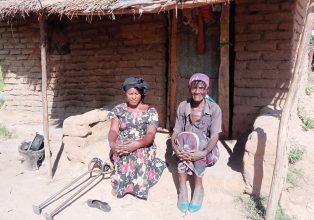Secrets of mental illness

Thirty-two-year-old Maryam Chimtembo from Likoloma Village in Zomba has been behaving abnormally. In fact, Gerald, her son, says she has been unpredictable.
“She wakes up in a good mood and abruptly turns violent and starts damaging property or, sometimes, fighting everybody. We believe she has been bewitched because her behaviour turns worse mostly during harvest season,” explains Gerald.
Gerald adds that she goes to the field, harvests crops and shares with everyone she meets—something that leaves the family without food. At times, he says, the mother breaks into laughter without anything fascinating around, talks endlessly on a minor issue or leaves home for days.
Despite all the signs of mental illness, Chimtembo’s relatives have always been against taking her to the hospital because they believe she is under the spell of witchcraft.
James Jalibu, a health surveillance assistant (HSA) for Likuma area in Group Village Head Matiya in Zomba concurs with Gerald, saying mental health is seriously misunderstood in most communities.
He says communities fail to understand that mental illness is a medical issue.
“There is a common distinction between normal and mental health problem, which most people know from uninformed perspective.
“It is until one undresses in public or stops taking shower and stays away from home when people can conclude that the person has mental health problems.
“The rest is linked to traditional myths and beliefs apart from witchcraft and drug and substance abuse,” says Jalibu.
Jalibu adds that Chimtembo could have been better by today if she had been taken to hospital in time.
According to Jalibu, Chimtembo developed mental illness after giving birth to her firstborn child in 1990.
“I spotted her while passing by her house. She was just talking loudly, but to herself and shouting at everybody. I inquired from her relatives and they told me she had been doing this since 1990,” says Jalibu.
Chimtembo’s story is just an example of thousands living with mental illness in Malawi, but lack timely guidance and support to seek medication at mental hospitals.
Random interviews with some Blantyre residents revealed that most individuals believe that those who walk naked, stop taking shower and leave home to the streets are mentally ill, but the rest are just confused and can recover without counselling or medication.
Limbika Sanganimalunje, a psychology lecture at Chancellor College, says Malawi’s challenge in the fight against mental illness is ignorance. She adds that the main problem is that most people cannot recognise the problem at initial stage so that patients are taken to the hospital in time.
“Mental illness begins slowly and becomes worse gradually. So the faster one seeks help the higher the chances of getting better,” she says.
The clinical psychologist says mental illness is a serious problem globally, but is being considered minor because of how it is defined by various quarters. She adds that mental illness is not only walking in rags or naked, but any unusual behaviour observed on an individual. She defines mental illness as a mental disorder which affects how one thinks, mood and behaviour.
“Mental health includes emotional, psychological and social well-being of an individual. To determine whether one is mentally ill, we look at how one is behaving, interacting with others, reasoning, association, self-esteem and others. If we observe unusual behaviours, then the person has to be counselled or taken to a mental hospital,” says Maliwichi-Sanganimalunje.
World Health Organisation (WHO) says the common mental health disorder called schizophrenia affects 21 million people worldwide. There are several causes of this health disorder. However, the common ones include family background, genes, life experiences such as depression and stress, poverty, substance and drug abuse and intoxication.
In Malawi, according to Chitsanzo Mafuta, a psychiatric clinical officer at Zomba Mental Hospital, one in every five people has mental health disorder.
“We are losing many people to serious mental illness because we are taking it lightly,” says Mafuta.
On the way forward, Mafuta and Maliwichi-Sanganimalunje say there is need to step up efforts in identifying mental illness at initial stage and refer the patients to hospitals in time. They also advised government to speed up the revision of the expired 2001-2005 Mental Health Policy, promote sensitisation and decentralise the system of identifying people with mental illness.
Mafuta says Mental Health in Zomba (MHiZ), a project involving HSAs to identify and counsel or refer people with mental illness to mental hospital, has proved to be vital and should be adopted nation wide.
“It is being implemented in the whole district. HSAs move around communities while observing the behaviours of people in their areas. When they see someone is behaving strangely, they try to counsel and if it doesn’t work, they refer them to nearby health centre and finally to Zomba Mental Hospital,” says Mafuta, adding that this has reduced the number of mental illness cases referred to the hospital from the district.
He adds that the HSA are vital in identifying mental illness patients because they live with the people in the community.
While calling for more funding from government, Mafuta said there has been stability in the availability of drugs recently and they are introducing patients to new drugs which, he says, will reduce resumption of mental illness in treated patients.
“The good thing is that mental illness is treated and new drug is proving very effective,” says Mafuta, adding that a patient can not admit being ill and so needs effort of relatives to support taking the patient for counselling or medication.




